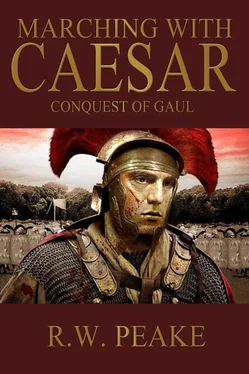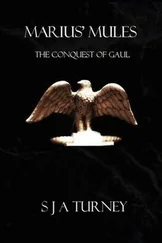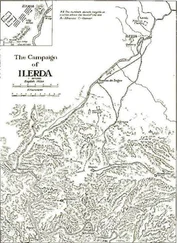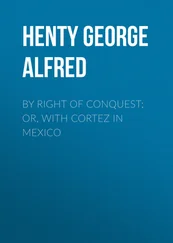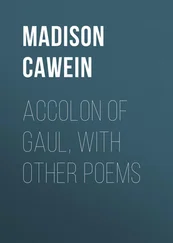R. Peake - Marching With Caesar - Conquest of Gaul
Здесь есть возможность читать онлайн «R. Peake - Marching With Caesar - Conquest of Gaul» весь текст электронной книги совершенно бесплатно (целиком полную версию без сокращений). В некоторых случаях можно слушать аудио, скачать через торрент в формате fb2 и присутствует краткое содержание. Жанр: Исторические приключения, на английском языке. Описание произведения, (предисловие) а так же отзывы посетителей доступны на портале библиотеки ЛибКат.
- Название:Marching With Caesar: Conquest of Gaul
- Автор:
- Жанр:
- Год:неизвестен
- ISBN:нет данных
- Рейтинг книги:3 / 5. Голосов: 1
-
Избранное:Добавить в избранное
- Отзывы:
-
Ваша оценка:
- 60
- 1
- 2
- 3
- 4
- 5
Marching With Caesar: Conquest of Gaul: краткое содержание, описание и аннотация
Предлагаем к чтению аннотацию, описание, краткое содержание или предисловие (зависит от того, что написал сам автор книги «Marching With Caesar: Conquest of Gaul»). Если вы не нашли необходимую информацию о книге — напишите в комментариях, мы постараемся отыскать её.
Marching With Caesar: Conquest of Gaul — читать онлайн бесплатно полную книгу (весь текст) целиком
Ниже представлен текст книги, разбитый по страницам. Система сохранения места последней прочитанной страницы, позволяет с удобством читать онлайн бесплатно книгу «Marching With Caesar: Conquest of Gaul», без необходимости каждый раз заново искать на чём Вы остановились. Поставьте закладку, и сможете в любой момент перейти на страницу, на которой закончили чтение.
Интервал:
Закладка:
My chest swelled, and for a brief instant I wished that by some miracle my family could be there to hear his words, even my accursed father. Perhaps then he would relent in his hatred of me, I thought. Concluding the meeting, Caesar finished, “Well, I just wanted to meet the young Gregarius I had heard so much about in the last couple of days. I will be keeping an eye on you, Pullus. I expect great things from you in the coming years.”
I did not even try to hide my pleasure. We were dismissed, and I felt I was a foot taller than when I had walked in. As we walked back to our area, the Pilus Prior grumbled, “Don’t go getting a big head now, boy. I'll still knock the cac out of you if you mess up.”
Despite the harshness of his words, I could tell by his tone that he was as pleased and proud as I was, so all I said was, “Yes Pilus Prior.”
Continuing our northward push, the army entered the lands of a tribe known to be particularly warlike and never fully accepting of the Romanization of Hispania to that point. They were called the Gallaeci, and were supposedly a branch of the Lusitani, yet to the Gregarii like me, it did not really matter much. They were enemies to be defeated because that was what Caesar, and by extension Rome, wished, so it would be done. There was one material difference between the rest of the Lusitani and the Gallaeci, and it was in their use of horses. While we had seen and been harassed by Lusitani cavalry before, the Gallaeci took it to another level, specializing in using missiles, either throwing something similar to our javelin or using bows. Although this was not unique, what made them different was in the way they would employ their cavalry, their warriors having learned the art of galloping around in a large circle, providing them with the security of constant motion and making them extremely hard to hit. When they were in part of the loop nearest to us, they would launch their missile attack, then keep riding in the loop to repeat it over and over again, until they either ran out of missiles or we found some way to drive them off. By this point in our campaign, Caesar had partially rectified the dearth of cavalry on our side by having cavalry auxiliaries sent to him. There was an ala of auxiliary cavalry, consisting of ten turmae attached to each Legion, so the ala consisted of a total of about 300 men at full strength. The trick was to use our cavalry properly as a screening force and as exploratores , but not send them out so far that they could not be recalled quickly to repel attack by the Gallaeci horsemen. The closer we approached the Durius (Douro) River, with the last Roman colony at the time being Portus Cale, the more lurid the tales became of the skill and devastating accuracy of these mythical horsemen. I believe that in every Legion there is a group of men determined to paint the grimmest picture that they can, and they foretell our defeat and slaughter in every upcoming battle. Why they do so I have no idea, but they are always given more credence than I think they deserve, and as I was to find out a few years later, their dire outlook could infect a whole Legion if the Centurions did not put an end to it.
It was near the Ides of Sextilis, meaning the campaign season was drawing to a close and in consequence, Caesar picked up the pace of the operations. Portus Cale had been taken by a confederation of the Gallaeci Bracari and the Gallaeci Lucenses, who normally warred on each other but were now united in their common hatred of Rome, and slaughtered all the Roman citizens who did not flee. By the time we arrived at the walls, Caesar’s practice with the last few towns and cities was well known, so there was never any question as far as the enemy was concerned whether or not he would offer terms. To delay the inevitable, they burned the bridge across the Douro, which at that time was made of wood, and it was here that Caesar made a demonstration of his abilities as an engineer. To be fair, it was a demonstration of his ability at design, since it was the praefectifabrorum who had to actually put his design into use. It was not as large or ambitious as his later bridge over the Rhenus (Rhine); still it clearly awed the Gallaeci, who stood watching helplessly from a distance as in the space of a day, a pontoon bridge was built over the river using confiscated boats. On top of the boats, planking was laid of a sufficient strength that a Legion and an ala of cavalry could march across to set up a defensive camp protecting the selected site. The main problem of building a more permanent bridge, besides the Gallaeci trying to destroy it, stemmed from the banks of the Douro rising up steeply from the river, with very little flat and stable riverbank on which to build. Much later a bridge of stone was erected, but at the time our orders were to erect one that was sufficient to allow the Legions, along with their baggage trains and artillery to pass over, just not one that would take more than a few days to build. One challenge was finding timber suitable for using as the piers to hold the bridge up, but within a half day of our arrival, Caesar had seen what needed to be done. Simultaneously ordering the construction of the pontoon bridge, he also sent several Cohorts and wagons out to scour the area for wood of sufficient size for a more permanent structure. It was found a half-day’s march from our location, and it was a good thing that Caesar did not tarry, because fairly quickly the Gallaeci succeeded in destroying the pontoon bridge, sending several fire rafts downstream to run into the boats holding the bridge up. This effectively cut the 9th off on the far bank, not as much of a military threat as it meant that the three day’s rations they marched over with would have to suffice. The 7th and 10th were left on the south side of the river as a labor force, while the artillery was set up on the high bank of the Douro to provide covering fire and to keep the Gallaeci from getting any more ideas. By dawn on the fourth day, the bridge was finished, and even from a distance it was easy to read the despair of the mounted men who were our constant shadows while we worked and the 9th watched. They made no attempt to attack the 9th in its camp, which was probably a mistake, though it was one that suited us perfectly fine. It was clear to us that they thought that they had earned enough of a reprieve that it would allow time for the Gallaeci Lucenses to send fresh reinforcements down from the north to help them stop us, but the problem for them was that Caesar knew it as well. However slight the delay was, we still had to be quick about taking the town, and it was here that Caesar made another one of his decisions that is a demonstration of his tactical brilliance. Leaving the 7th to besiege the town, he continued the march north with the 9th and 10th to confront the Lucenses separately, trusting the 7th to take care of the Bracari. This was totally unexpected by both parts of the enemy force, and it was no more than two days after we crossed the Douro that our scouts came galloping back to the main column to report that they had spotted the advance scouts of the Lucenses column. Approaching to within sight of their own advance party, for the better part of a third of a watch the two sides sat on opposing hills no more than two miles away while the Lucenses scouts and what we presumed were their leaders talked over what to do. Not that we were idle; the cornu and bucina were blaring out orders that told us to array along the top of the hill in a triplexacies , although we still were waiting for the 9th to arrive in full since they were marching drag. But as usual, Caesar knew what he was doing. Just the sight of our one Legion making preparation for battle was enough to convince the Lucenses that they needed to fight another day, and even before we finished shaking out into battle formation, the dust cloud that signaled the location of their column began to rise in the air again as they reversed march to head back north. Resuming our own progress, as soon as we approached the hill from which they had observed us, we saw in the distance beyond that there was yet another formation a short distance behind the original column, traveling on a parallel track that was more to the east than the one that we had been observing. Seeing this other force, Caesar decided to wait and see what they would do, deciding that we had gone far enough that day and ordering us to make a marching camp on top of the hill. It was while we were in the process of making camp that a courier from the first column obviously made it to the second, because they also turned around to head back north, deciding to find better ground, which we expected. What we did not expect was that they would pick an island, or rather, a number of islands.
Читать дальшеИнтервал:
Закладка:
Похожие книги на «Marching With Caesar: Conquest of Gaul»
Представляем Вашему вниманию похожие книги на «Marching With Caesar: Conquest of Gaul» списком для выбора. Мы отобрали схожую по названию и смыслу литературу в надежде предоставить читателям больше вариантов отыскать новые, интересные, ещё непрочитанные произведения.
Обсуждение, отзывы о книге «Marching With Caesar: Conquest of Gaul» и просто собственные мнения читателей. Оставьте ваши комментарии, напишите, что Вы думаете о произведении, его смысле или главных героях. Укажите что конкретно понравилось, а что нет, и почему Вы так считаете.
